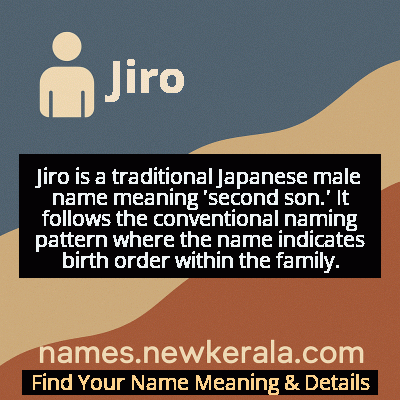Jiro Name Meaning & Details
Origin, Popularity, Numerology Analysis & Name Meaning of Jiro
Discover the origin, meaning, and cultural significance of the name JIRO. Delve into its historical roots and explore the lasting impact it has had on communities and traditions.
Name
Jiro
Gender
Male
Origin
Japanese
Lucky Number
7
Meaning of the Name - Jiro
Jiro is a traditional Japanese male name meaning 'second son.' It follows the conventional naming pattern where the name indicates birth order within the family.
Jiro - Complete Numerology Analysis
Your Numerology Number
Based on Pythagorean Numerology System
Ruling Planet
Neptune (Ketu)
Positive Nature
Intuitive, analytical, spiritual, and inquisitive.
Negative Traits
Secretive, reserved, aloof, and can be overly critical.
Lucky Colours
Green, yellow.
Lucky Days
Monday.
Lucky Stones
Cat’s eye, moonstone.
Harmony Numbers
1, 5, 6.
Best Suited Professions
Scientists, researchers, spiritual leaders, detectives.
What People Like About You
Depth of knowledge, analytical skills, spirituality.
Famous People Named Jiro
Jiro Horikoshi
Aircraft designer
Chief engineer of the Mitsubishi A6M Zero fighter aircraft
Jiro Ono
Sushi chef
World-renowned sushi master with 3-Michelin-star restaurant Sukiyabashi Jiro
Jiro Taniguchi
Manga artist
Award-winning manga creator known for works like 'The Walking Man' and 'A Distant Neighborhood'
Jiro Yoshihara
Artist
Founder of the Gutai Art Association, influential Japanese avant-garde art movement
Name Variations & International Equivalents
Click on blue names to explore their detailed meanings. Gray names with will be available soon.
Cultural & Historical Significance
The name Jiro embodies centuries of Japanese cultural values emphasizing family harmony, respect for hierarchy, and the importance of knowing one's place within the social structure. During the Edo period and earlier, this naming convention was particularly important in samurai and merchant families where birth order determined inheritance rights and family responsibilities. While modern naming practices have become more diverse, Jiro remains a recognizable link to these traditional values and continues to carry the weight of Japanese cultural heritage, representing both historical continuity and the evolving nature of Japanese identity.
Extended Personality Analysis
Individuals named Jiro are often perceived as reliable, supportive, and team-oriented, reflecting their traditional role as the second son in Japanese families. They tend to be practical problem-solvers who excel in supporting roles rather than seeking the spotlight. This aligns with the historical expectation for second sons to be dependable supporters of their elder siblings while developing their own unique strengths. Jiros are typically seen as balanced individuals who combine traditional values with modern adaptability—they respect hierarchy and established systems while being flexible enough to navigate changing circumstances.
Many exhibit strong loyalty to family and close relationships, along with a quiet determination that allows them to achieve excellence in their chosen fields without excessive self-promotion. Their personality often reflects a blend of humility and competence, making them valued members of any team or organization. The name carries connotations of someone who is thorough, meticulous, and dedicated to mastering their craft, as exemplified by famous bearers like Jiro Ono. This association with craftsmanship and dedication suggests individuals who take pride in quality work and sustained effort rather than quick achievements or flashy accomplishments.
Modern Usage & Popularity
In contemporary Japan, Jiro maintains steady usage as both a traditional given name and occasionally as a surname, though its popularity has declined compared to more modern naming trends. The name is experiencing a mild revival among parents seeking traditional Japanese names with clear meanings and cultural heritage. While no longer as common as in previous generations, Jiro continues to be chosen by families who value its historical significance and straightforward meaning. Internationally, the name has gained some recognition through famous bearers like Jiro Ono, contributing to its use in Japanese diaspora communities. Modern Jiros often go by the full name rather than nicknames, maintaining the formal and respectful tone the name carries. The name's usage reflects a balance between honoring tradition and adapting to contemporary naming preferences, with some parents choosing it specifically for its cultural authenticity and clear symbolic meaning.
Symbolic & Spiritual Meanings
Symbolically, Jiro represents the concept of supportive strength and reliable succession within family and social structures. The name embodies the Japanese values of wa (harmony) and giri (duty), suggesting someone who understands their role in larger systems and fulfills it with dedication. Metaphorically, Jiro signifies the bridge between tradition and modernity—honoring established ways while adapting to contemporary needs. It represents the idea that not all leadership comes from the front, and that supporting roles can be equally vital to collective success. The name carries connotations of steady progress, loyal partnership, and the quiet excellence that comes from mastering one's craft without seeking external validation. In broader symbolic terms, Jiro represents the Japanese aesthetic of wabi-sabi—finding beauty in imperfection and transience—through its association with dedicated craftsmanship and the understanding that true mastery comes from lifelong commitment rather than innate talent alone.

